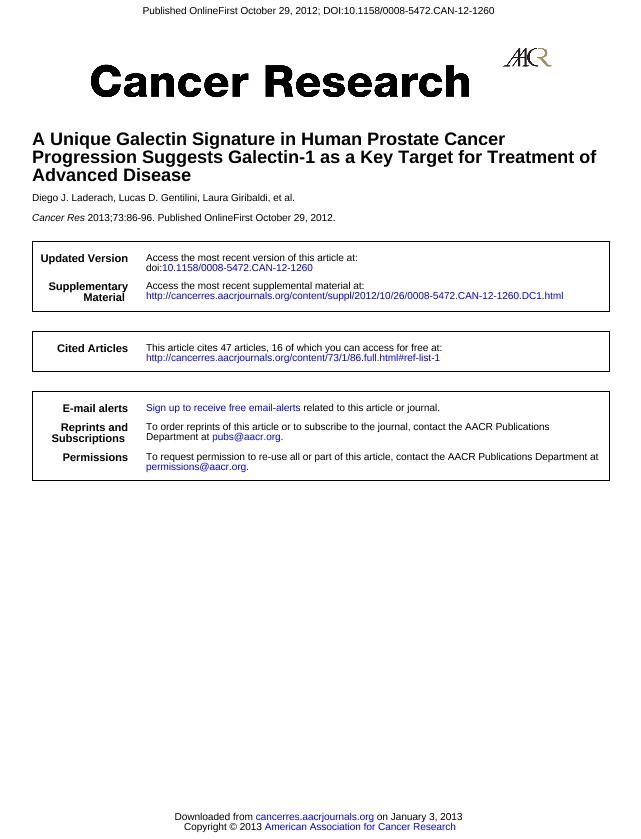Artículo
A Unique Galectin Signature in Human Prostate Cancer Progression Suggests Galectin-1 as a Key Target for Treatment of Advanced Disease
Laderach, Diego Jose ; Gentilini, Lucas Daniel
; Gentilini, Lucas Daniel ; Giribaldi, María Laura
; Giribaldi, María Laura ; Cardenas Delgado, Victor Manuel
; Cardenas Delgado, Victor Manuel ; Nugnes, Lorena Gisela
; Nugnes, Lorena Gisela ; Croci Russo, Diego Omar
; Croci Russo, Diego Omar ; Al Nakouzi, Nader; Sacca, Paula Alejandra
; Al Nakouzi, Nader; Sacca, Paula Alejandra ; Casas, Gabriel; Mazza, Osvaldo Néstor; Shipp, Margaret A.; Vazquez, Elba Susana
; Casas, Gabriel; Mazza, Osvaldo Néstor; Shipp, Margaret A.; Vazquez, Elba Susana ; Chauchereau, Anne; Kutok, Jeffery L.; Rodig, Scott J.; Elola, Maria Teresa
; Chauchereau, Anne; Kutok, Jeffery L.; Rodig, Scott J.; Elola, Maria Teresa ; Compagno, Daniel Georges
; Compagno, Daniel Georges ; Rabinovich, Gabriel Adrián
; Rabinovich, Gabriel Adrián
 ; Gentilini, Lucas Daniel
; Gentilini, Lucas Daniel ; Giribaldi, María Laura
; Giribaldi, María Laura ; Cardenas Delgado, Victor Manuel
; Cardenas Delgado, Victor Manuel ; Nugnes, Lorena Gisela
; Nugnes, Lorena Gisela ; Croci Russo, Diego Omar
; Croci Russo, Diego Omar ; Al Nakouzi, Nader; Sacca, Paula Alejandra
; Al Nakouzi, Nader; Sacca, Paula Alejandra ; Casas, Gabriel; Mazza, Osvaldo Néstor; Shipp, Margaret A.; Vazquez, Elba Susana
; Casas, Gabriel; Mazza, Osvaldo Néstor; Shipp, Margaret A.; Vazquez, Elba Susana ; Chauchereau, Anne; Kutok, Jeffery L.; Rodig, Scott J.; Elola, Maria Teresa
; Chauchereau, Anne; Kutok, Jeffery L.; Rodig, Scott J.; Elola, Maria Teresa ; Compagno, Daniel Georges
; Compagno, Daniel Georges ; Rabinovich, Gabriel Adrián
; Rabinovich, Gabriel Adrián
Fecha de publicación:
01/2013
Editorial:
American Association for Cancer Research
Revista:
Cancer Research
ISSN:
0008-5472
Idioma:
Inglés
Tipo de recurso:
Artículo publicado
Clasificación temática:
Resumen
Galectins, a family of glycan-binding proteins, influence tumor progression by modulating interactions between tumor, endothelial, stromal, and immune cells. Despite considerable progress in identifying the roles of individual galectins in tumor biology, an integrated portrait of the galectin network in different tumor microenvironments is still missing. We undertook this study to analyze the "galectin signature" of the human prostate cancer microenvironment with the overarching goal of selecting novel-molecular targets for prognostic and therapeutic purposes. In examining androgen-responsive and castration-resistant prostate cancer cells and primary tumors representing different stages of the disease, we found that galectin-1 (Gal-1) was the most abundantly expressed galectin in prostate cancer tissue and was markedly upregulated during disease progression. In contrast, all other galectins were expressed at lower levels: Gal-3, -4, -9, and -12 were downregulated during disease evolution, whereas expression of Gal-8 was unchanged. Given the prominent regulation of Gal-1 during prostate cancer progression and its predominant localization at the tumor-vascular interface, we analyzed the potential role of this endogenous lectin in prostate cancer angiogenesis. In human prostate cancer tissue arrays, Gal-1 expression correlated with the presence of blood vessels, particularly in advanced stages of the disease. Silencing Gal-1 in prostate cancer cells reduced tumor vascularization without altering expression of other angiogenesis-related genes. Collectively, our findings identify a dynamically regulated "galectin-specific signature" that accompanies disease evolution in prostate cancer, and they highlight a major role for Gal-1 as a tractable target for antiangiogenic therapy in advanced stages of the disease.
Palabras clave:
Prostate Cancer
,
Protein/Glycan Interactions
,
Galectins
,
Angiogenesis
Archivos asociados
Licencia
Identificadores
Colecciones
Articulos(IQUIBICEN)
Articulos de INSTITUTO DE QUIMICA BIOLOGICA DE LA FACULTAD DE CS. EXACTAS Y NATURALES
Articulos de INSTITUTO DE QUIMICA BIOLOGICA DE LA FACULTAD DE CS. EXACTAS Y NATURALES
Citación
Laderach, Diego Jose; Gentilini, Lucas Daniel; Giribaldi, María Laura; Cardenas Delgado, Victor Manuel; Nugnes, Lorena Gisela; et al.; A Unique Galectin Signature in Human Prostate Cancer Progression Suggests Galectin-1 as a Key Target for Treatment of Advanced Disease; American Association for Cancer Research; Cancer Research; 73; 1; 1-2013; 86-96
Compartir
Altmétricas



